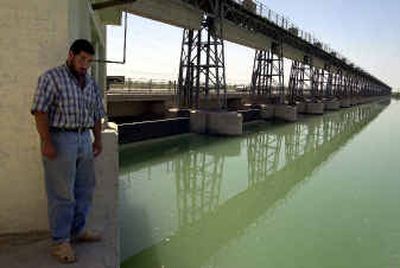GIs charged in Iraqi’s drowning

SAMARRA, Iraq — The 19-year-old Iraqi’s swimming skills were no match for the Tigris. “Marwan, save me!” Zaidoun Fadel Hassoun screamed to his cousin, himself struggling to stay afloat.
The teenager drowned; his cousin made it to shore. “I could hear them laughing,” Marwan Fadel Hassoun said, recalling how U.S. soldiers pushed the young men into the river. “They were behaving like they were watching a comedy on stage.”
The U.S. military said last week that three soldiers, now back in their base at Fort Carson, Colo., have been charged with involuntary manslaughter in the Jan. 3 drowning of an Iraqi detainee. A fourth soldier faces charges of pushing a second man, who survived, into the same river.
The military identified the victims only as Mr. Fadel and Mr. Fadhil. The four soldiers face between 5 1/2 years and 26 1/2 years in prison if convicted on all charges.
Thousands of Iraqi civilians have died since the Iraq war began in March 2003. Some of them perished in the U.S.-led air and ground campaign. In the 15 months since the fall of Baghdad, many more have died in car bombings, or when caught in the crossfire as American troops battled insurgents or were simply in the wrong place at the wrong time.
With every such death, Iraqis point to what they see as the heavy-handedness of the U.S. military. The resentment is deeper when the victims are relatives, friends or neighbors.
Zaidoun Hassoun was to have finished high school this year. Three weeks before his death, he got engaged to a cousin, and he hoped to start a family in Samarra, a trade and agriculture center whose name means “pleasant to those who see it.”
For Marwan Hassoun, a bearded and burly 23-year-old who attends a teachers’ college, the death robbed him of a companion and a childhood friend. Zaidoun’s voice pleading for help still echoes in his ears.
Trouble for Zaidoun and Marwan began about 10:45 p.m., 15 minutes before curfew came into force in Samarra and only 200 yards from their home at the end of a 100-mile journey.
The trip, which should have been routine in a pickup truck loaded with Italian-made bathroom fixtures from Baghdad, was made longer because of a recurring engine problem that Marwan had to fix along the way.
They were stopped and searched at an Iraqi checkpoint on Samarra’s outskirts and allowed to enter town. Minutes later, a U.S. patrol — Marwan believes it was made up of four Bradley fighting vehicles — crossed the median and blocked their path.
They quickly searched the cargo and checked their identity documents, he said at the family’s store that sells Chinese-made appliances, stationery and books.
“What’s happening?” a terrified Zaidoun whispered to his cousin. The Bradley drove for a few minutes before the two were ordered out at a bridge across the Tigris that also serves as a dam, several miles north of Samarra.
The soldiers — Marwan remembers four or five of them — removed their handcuffs and led them to a concrete ledge. Ordered to jump into the water, Marwan begged for mercy.
“Why? why?” he pleaded. “Shut up, shut up!” yelled the soldier who spoke some Arabic.
Zaidoun was pushed first. He held on to a soldier, who managed to free himself. Other soldiers joined in and pushed Zaidoun away. When Marwan turned to look at his cousin, he was pushed from behind.
“He was shouting ‘Marwan, save me,’ and I yelled back ‘Try to swim, try to swim,’ but he went under again and that was it. I could hear them (the soldiers) laughing. They were behaving like they were watching a comedy on stage,” he said.
Standing at the scene Tuesday, he pointed to a cluster of bamboo at the water’s edge.
His tormentors drove off, but he continued to huddle in fear. Only when he reached an Iraqi checkpoint, more than two hours after his ordeal began, did he feel safe.